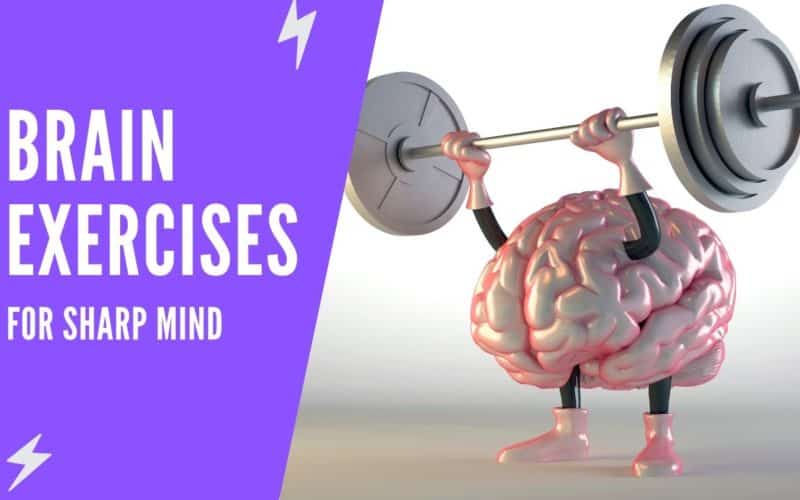As we age, our brain’s ability to process information, recall memories and stay focused decreases. However, there are many brain exercises that we can do to keep our mind sharp, improve cognitive function, and maintain our mental agility. In this article, we will discuss some of the best brain exercises that will help you stay sharp and focused.
Brain Exercises to Keep Your Mind Sharp:
1. Brain games
There are many different brain games available that can help to improve cognitive function, increase mental agility, and prevent age-related cognitive decline. These games include memory games, problem-solving games, and strategy games. They are an excellent way to keep your mind active and engaged, and they can be fun and challenging.
2. Try looking at objects from different perspectives
A clock is always hung on the wall the right way up and the same with a calendar. This way, your brains have become accustomed to seeing things in a particular way. You can test your brain’s interpreting ability by challenging it.
Try holding a TV remote upside down and then switching channels. Alternatively, view a photo frame or calendar the other way around. You could even try wearing your watch upside down.
If you continue this brain sharpening exercise, your brain will become more alert when it has to interpret new situations. Moreover, it will get accustomed to new situations and circumstances which is obviously good for the brain.
3. Memory Games
Memory games are a great way to improve your memory retention. You can play memory games by memorizing a list of items or pictures and then recalling them. You can also play memory games online or download memory game apps.
4. Switch hands
If you are right-handed, try using your left hand to perform tasks such as brushing, writing, and eating. This is because your brain gets used to doing things a certain way and it needs some jolting.
Using your non–dominant hand stimulates activity in the non-active side of your brain. This can be difficult at first, but it will give your mind some good exercise.
5. Perform some tasks with your eyes closed
We do many of our daily tasks without even thinking about them. So, to introduce the challenge to your brain, try performing the following brain exercises with your eyes closed.
This includes taking a shower, sorting out laundry, and navigating from one room to another. This forces our brain to use new neural pathways and hence makes it more alert and sharper.
6. Order different dishes when eating out
Many of us will skim through a menu at a restaurant despite knowing that we will order the same dish as always. But try ordering different dishes or cuisines. Doing this brain exercise will ask your brains to interpret the new smells and tastes.
It will also activate the respective receptor cells. The different tastes and smells will also provide new sensations to your mind. You can also try experimenting with your food at home.
Try to cook a new recipe or simply add a different ingredient or spice to your usual meals. It is interesting to note that this particular exercise can be very difficult for some people who like their food a certain way or who are not comfortable with changing their taste pallets.
7. Meditation
Meditation is a great way to calm your mind and reduce stress. It helps to improve concentration, boost memory retention, and increase cognitive function. Regular meditation practice helps to reduce anxiety, depression, and other mental health conditions. It is an excellent way to maintain mental agility, and research has shown that meditation can help to prevent age-related cognitive decline.
8. Reading
Reading is an excellent brain exercise that helps to improve cognitive function, increase vocabulary, and reduce stress. Reading is a great way to keep your mind engaged, and it can help to prevent age-related cognitive decline. It is also an excellent way to reduce stress and improve mood, which can have a positive impact on overall mental health.
9. Socializing helps your brain
Socializing is an excellent way to keep your mind sharp, reduce stress, and improve mental health. It helps to improve cognitive function, increase social skills, and reduce the risk of depression and anxiety. Socializing can be as simple as having a conversation with a friend, attending a social event, or joining a social club.
10. Try to use all of your senses simultaneously
Engage yourself in activities that use all your senses. These include camping, traveling, gardening, and even grocery shopping. Also, try learning new skills such as playing chess or a musical instrument.
11. Remember to intake proper nutrients
Include foods in your diet that will help improve brainpower. There are many foods for promoting brain health and mood-boosting. Such foods include coconut oil, walnuts, eggs, avocado, and turmeric. They contain essential vitamins and fats which are important for the proper functioning of your brain.
12. Crossword Puzzles
Crosswords and puzzles are excellent brain exercises that help to improve memory, reasoning, and problem-solving skills. These activities help to keep your mind active and engaged, which can help to prevent age-related cognitive decline. There are many different types of puzzles and crosswords available, so find one that you enjoy and incorporate it into your daily routine.
13. Sudoku
Sudoku is a number puzzle that requires you to place numbers in a grid so that each row, column, and 3×3 sub-grid contains all the numbers from 1 to 9. Sudoku is a great brain exercise that improves concentration and logical reasoning. It can be found in newspapers, magazines, and online.
14. Brain Teasers
Brain teasers are puzzles or riddles that require you to think outside the box. Brain teasers can be found in books, magazines, and online. They can help to improve problem-solving skills, memory, and cognitive function.
15. Learn a New Language
Learning a new language is an excellent way to challenge your brain, improve cognitive function, and increase mental agility. It helps to improve memory, attention, and processing speed. Learning a new language can be a fun and exciting experience, and it can help to keep your mind sharp and engaged.
16. Exercise
Physical exercise is not only great for our physical health, but it is also great for our mental health. Regular exercise helps to improve blood flow to the brain, increase oxygen levels, and reduce inflammation, which can lead to better brain function. Exercise is also known to increase the production of endorphins, which are natural painkillers that help to improve mood, reduce anxiety and depression.
In conclusion, there are many different brain exercises that we can do to keep our mind sharp, improve cognitive function, and maintain our mental agility. These exercises include meditation, exercise, crosswords, learning a new language, reading, brain games, and socializing. Incorporating these activities into your daily routine can help to prevent age-related cognitive decline, improve mental health, and enhance overall quality of life. So, start incorporating these brain exercises into your daily routine and start experiencing the benefits of a sharp and focused mind.





